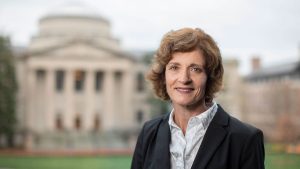Autism: ‘A Family Experience’

UNC-Chapel Hill alum Kelley Altman Greer ’92 has personally and professionally witnessed the impact of autism on individuals and families. As a school psychologist and counselor in the Atlanta area for 20-plus years, and throughout her career in both public and private schools, she said she has seen a lot of families struggling.
“I noticed how the families that were privy to extensive resources had much more positive experiences than the families with socioeconomic constraints or lack of knowledge and education,” Kelley shared. “To see that contrast and what those different families experienced ― and autism is a family experience ― was powerful for me.”
As Kelley reflected on what she wanted her and her family’s charitable giving to support, she said the Autism Research Center was “a natural fit.”
“UNC-Chapel Hill has a long history of putting time and energy into autism community resources, and a rich history of devotion and intentional autism research. This is what I’m passionate about.”
Kelley and her parents ― Gardner H. Altman Jr. ’68, ’71 (J.D.) and Mary (Altman) Byrd ’67, also Carolina alums ― pooled resources to establish the Kelley Altman Greer Family Autism Research Fund. The fund will fund four pilot grants for junior faculty conducting autism research at Carolina.
“We were interested in providing funding and resources for the experts here in Chapel Hill to help expand research, education and advocacy ― however they see fit to best use those funds,” added Kelley.
Kelley is currently a behavioral health education consultant with the University of North Carolina System. The North Carolina native has infused her family values of education and service into her 20-plus-year career. Regardless of where she’s chosen to dedicate her expertise, her focus has been the same: to create a culture that allows students to succeed.
“Over the years of my career, we’ve gotten much better at identifying individuals on the autism spectrum ― and realizing that it is a spectrum,” Kelley continued. “Because it’s a spectrum disorder, there’s so much variance in what is needed. I encourage others to support this important research center ― to give so that more families can have a more positive experience.”